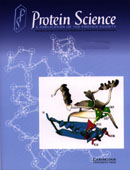Crossref Citations
This article has been cited by the following publications. This list is generated based on data provided by
Crossref.
Yan, Ning
Doelling, Jed H.
Falbel, Tanya G.
Durski, Adam M.
and
Vierstra, Richard D.
2000.
The Ubiquitin-Specific Protease Family from Arabidopsis.AtUBP1 and 2 Are Required for the Resistance to the Amino Acid Analog Canavanine.
Plant Physiology,
Vol. 124,
Issue. 4,
p.
1828.
Jentsch, Stefan
and
Pyrowolakis, George
2000.
Ubiquitin and its kin: how close are the family ties?.
Trends in Cell Biology,
Vol. 10,
Issue. 8,
p.
335.
Leggett, David S.
Hanna, John
Borodovsky, Anna
Crosas, Bernat
Schmidt, Marion
Baker, Rohan T.
Walz, Thomas
Ploegh, Hidde
and
Finley, Daniel
2002.
Multiple Associated Proteins Regulate Proteasome Structure and Function.
Molecular Cell,
Vol. 10,
Issue. 3,
p.
495.
Chernova, Tatiana A.
Allen, Kim D.
Wesoloski, Lisa M.
Shanks, John R.
Chernoff, Yury O.
and
Wilkinson, Keith D.
2003.
Pleiotropic Effects of Ubp6 Loss on Drug Sensitivities and Yeast Prion Are Due to Depletion of the Free Ubiquitin Pool.
Journal of Biological Chemistry,
Vol. 278,
Issue. 52,
p.
52102.
Gao, Yong‐Guang
Song, Ai‐Xin
Shi, Yan‐Hong
Chang, Yong‐Gang
Liu, Shu‐Xun
Yu, Yi‐Zi
Cao, Xue‐Tao
Lin, Dong‐Hai
and
Hu, Hong‐Yu
2005.
Solution structure of the ubiquitin‐like domain of human DC‐UbP from dendritic cells.
Protein Science,
Vol. 14,
Issue. 8,
p.
2044.
O'Donoghue, Jean E.
and
Gordon, Colin
2005.
Protein Degradation.
p.
157.
Hu, Min
Li, Pingwei
Song, Ling
Jeffrey, Philip D
Chenova, Tatiana A
Wilkinson, Keith D
Cohen, Robert E
and
Shi, Yigong
2005.
Structure and mechanisms of the proteasome-associated deubiquitinating enzyme USP14.
The EMBO Journal,
Vol. 24,
Issue. 21,
p.
3747.
Moon, Byeong Cheol
Choi, Man Soo
Kang, Yun Hwan
Kim, Min Chul
Cheong, Mi Sun
Park, Chan Young
Yoo, Jae Hyuk
Koo, Sung Cheol
Lee, Sang Min
Lim, Chae Oh
Cho, Moo Je
and
Chung, Woo Sik
2005.
Arabidopsis ubiquitin‐specific protease 6 (AtUBP6) interacts with calmodulin.
FEBS Letters,
Vol. 579,
Issue. 18,
p.
3885.
Maupin‐Furlow, Julie A.
Humbard, Matthew A.
Kirkland, P. Aaron
Li, Wei
Reuter, Christopher J.
Wright, Amy J.
and
Zhou, G.
2006.
Vol. 75,
Issue. ,
p.
125.
Ratia, Kiira
Saikatendu, Kumar Singh
Santarsiero, Bernard D.
Barretto, Naina
Baker, Susan C.
Stevens, Raymond C.
and
Mesecar, Andrew D.
2006.
Severe acute respiratory syndrome coronavirus papain-like protease: Structure of a viral deubiquitinating enzyme.
Proceedings of the National Academy of Sciences,
Vol. 103,
Issue. 15,
p.
5717.
Zhu, Xiao
Ménard, Robert
and
Sulea, Traian
2007.
High incidence of ubiquitin‐like domains in human ubiquitin‐specific proteases.
Proteins: Structure, Function, and Bioinformatics,
Vol. 69,
Issue. 1,
p.
1.
O'Donoghue, Jean E.
and
Gordon, Colin
2007.
Protein Degradation Series.
p.
157.
Rosenzweig, Rina
Bronner, Vered
Zhang, Daoning
Fushman, David
and
Glickman, Michael H.
2012.
Rpn1 and Rpn2 Coordinate Ubiquitin Processing Factors at Proteasome.
Journal of Biological Chemistry,
Vol. 287,
Issue. 18,
p.
14659.
Kim, Hyoung Tae
and
Goldberg, Alfred L.
2017.
The deubiquitinating enzyme Usp14 allosterically inhibits multiple proteasomal activities and ubiquitin-independent proteolysis.
Journal of Biological Chemistry,
Vol. 292,
Issue. 23,
p.
9830.
Kim, Hyoung Tae
and
Goldberg, Alfred L.
2018.
UBL domain of Usp14 and other proteins stimulates proteasome activities and protein degradation in cells.
Proceedings of the National Academy of Sciences,
Vol. 115,
Issue. 50,




